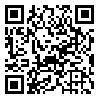Thu, Feb 19, 2026
| فارسی
Volume 13, Issue 4 (Winter 2012)
Advances in Cognitive Sciences 2012, 13(4): 37-48 |
Back to browse issues page
Download citation:
BibTeX | RIS | EndNote | Medlars | ProCite | Reference Manager | RefWorks
Send citation to:



BibTeX | RIS | EndNote | Medlars | ProCite | Reference Manager | RefWorks
Send citation to:
Nazari M A, Mirloo M M, Asadzadeh S. Time Perception Error in The Processing of Emotional Persian Words. Advances in Cognitive Sciences 2012; 13 (4) :37-48
URL: http://icssjournal.ir/article-1-393-en.html
URL: http://icssjournal.ir/article-1-393-en.html
1- neuroscience, Assistant Professor, University of Tabriz, Tabriz, Iran.
2- M.A. student in general psychology
3- B.A. student in clinical psychology
2- M.A. student in general psychology
3- B.A. student in clinical psychology
Abstract: (4703 Views)
Objective: Several factors have been shown to affect perceived durations. In the present study, we verified the hypothesis that emotional states induced by Persian words influence error in time perception.
Method: Sixty-three volunteer undergraduate female students of the University of Tabriz participated in the experiment. By means of a computerized test, a set of emotional Persian words rated for valence and arousal (using Self-Assessment Manikin - SAM) were projected to all participants for 2, 5 and 8 seconds. Two-factor ANOVA with repeated measures, one-way ANOVA, paired and independent t-tests were used to analyze data.
Results: A significant main effect of Emotion, and Duration was found. Emotion and Duration interaction effect was also significant. Emotional words (especially negative ones) assessed to be shorter than neutral ones (under-estimation error). Shorter perceived duration was greater for 2 second standard duration.
Conclusion: These findings indicate an effect of emotion on time perception. The results are interpreted in the framework of the attentional time perception and arousal time perception models.
Method: Sixty-three volunteer undergraduate female students of the University of Tabriz participated in the experiment. By means of a computerized test, a set of emotional Persian words rated for valence and arousal (using Self-Assessment Manikin - SAM) were projected to all participants for 2, 5 and 8 seconds. Two-factor ANOVA with repeated measures, one-way ANOVA, paired and independent t-tests were used to analyze data.
Results: A significant main effect of Emotion, and Duration was found. Emotion and Duration interaction effect was also significant. Emotional words (especially negative ones) assessed to be shorter than neutral ones (under-estimation error). Shorter perceived duration was greater for 2 second standard duration.
Conclusion: These findings indicate an effect of emotion on time perception. The results are interpreted in the framework of the attentional time perception and arousal time perception models.
Type of Study: Research |
Subject:
Special
Received: 2011/08/23 | Accepted: 2011/10/23 | Published: 2011/12/22
Received: 2011/08/23 | Accepted: 2011/10/23 | Published: 2011/12/22
Send email to the article author
| Rights and permissions | |
 |
This work is licensed under a Creative Commons Attribution-NonCommercial 4.0 International License. |



